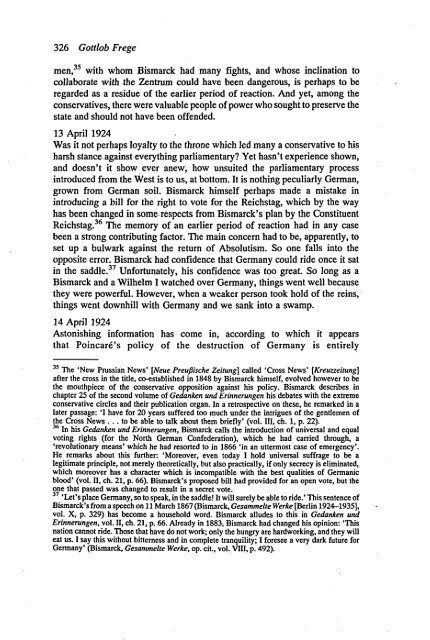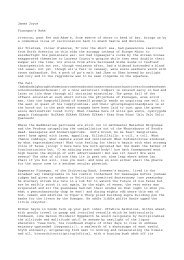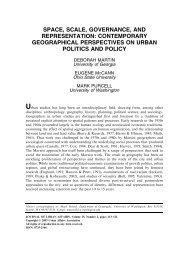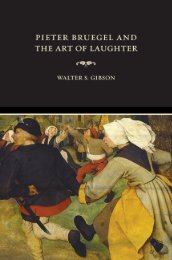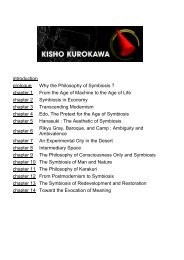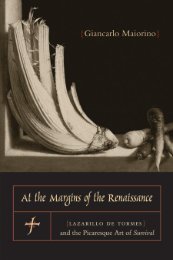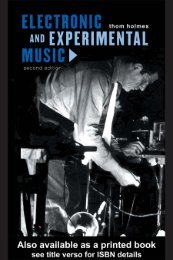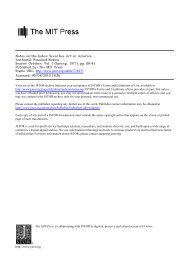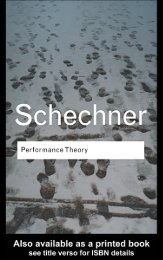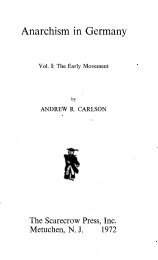Diary: Written by professor Dr Gottlob Frege in the ... - AAAARG.ORG
Diary: Written by professor Dr Gottlob Frege in the ... - AAAARG.ORG
Diary: Written by professor Dr Gottlob Frege in the ... - AAAARG.ORG
Create successful ePaper yourself
Turn your PDF publications into a flip-book with our unique Google optimized e-Paper software.
326 <strong>Gottlob</strong> <strong>Frege</strong><br />
men, 35 with whom Bismarck had many fights, and whose <strong>in</strong>cl<strong>in</strong>ation to<br />
collaborate with <strong>the</strong> Zentrum could have been dangerous, is perhaps to be<br />
regarded as a residue of <strong>the</strong> earlier period of reaction. And yet, among <strong>the</strong><br />
conservatives, <strong>the</strong>re were valuable people of power who sought to preserve <strong>the</strong><br />
state and should not have been offended.<br />
13 April 1924<br />
Was it not perhaps loyalty to <strong>the</strong> throne which led many a conservative to his<br />
harsh stance aga<strong>in</strong>st everyth<strong>in</strong>g parliamentary? Yet hasn't experience shown,<br />
and doesn't it show ever anew, how unsuited <strong>the</strong> parliamentary process<br />
<strong>in</strong>troduced from <strong>the</strong> West is to us, at bottom. It is noth<strong>in</strong>g peculiarly German,<br />
grown from German soil. Bismarck himself perhaps made a mistake <strong>in</strong><br />
<strong>in</strong>troduc<strong>in</strong>g a bill for <strong>the</strong> right to vote for <strong>the</strong> Reichstag, which <strong>by</strong> <strong>the</strong> way<br />
has been changed <strong>in</strong> some respects from Bismarck's plan <strong>by</strong> <strong>the</strong> Constituent<br />
Reichstag. 36 The memory of an earlier period of reaction had <strong>in</strong> any case<br />
been a strong contribut<strong>in</strong>g factor. The ma<strong>in</strong> concern had to be, apparently, to<br />
set up a bulwark aga<strong>in</strong>st <strong>the</strong> return of Absolutism. So one falls <strong>in</strong>to <strong>the</strong><br />
opposite error. Bismarck had confidence that Germany could ride once it sat<br />
<strong>in</strong> <strong>the</strong> saddle. 37 Unfortunately, his confidence was too great. So long as a<br />
Bismarck and a Wilhelm I watched over Germany, th<strong>in</strong>gs went well because<br />
<strong>the</strong>y were powerful. However, when a weaker person took hold of <strong>the</strong> re<strong>in</strong>s,<br />
th<strong>in</strong>gs went downhill with Germany and we sank <strong>in</strong>to a swamp.<br />
14 April 1924<br />
Astonish<strong>in</strong>g <strong>in</strong>formation has come <strong>in</strong>, accord<strong>in</strong>g to which it appears<br />
that Po<strong>in</strong>care's policy of <strong>the</strong> destruction of Germany is entirely<br />
35 The 'New Prussian News' [Neue Preußische Zeitung] called 'Cross News' [Kreuzzeitung]<br />
after <strong>the</strong> cross <strong>in</strong> <strong>the</strong> title, co-established <strong>in</strong> 1848 <strong>by</strong> Bismarck himself, evolved however to be<br />
<strong>the</strong> mouthpiece of <strong>the</strong> conservative opposition aga<strong>in</strong>st his policy. Bismarck describes <strong>in</strong><br />
chapter 25 of <strong>the</strong> second volume of Gedanken und Er<strong>in</strong>nerungen his debates with <strong>the</strong> extreme<br />
conservative circles and <strong>the</strong>ir publication organ. In a retrospective on <strong>the</strong>se, he remarked <strong>in</strong> a<br />
later passage: 'I have for 20 years suffered too much under <strong>the</strong> <strong>in</strong>trigues of <strong>the</strong> gentlemen of<br />
<strong>the</strong> Cross News ... to be able to talk about <strong>the</strong>m briefly' (vol. III, ch. 1, p. 22).<br />
36 In his Gedanken und Er<strong>in</strong>nerungen, Bismarck calls <strong>the</strong> <strong>in</strong>troduction of universal and equal<br />
vot<strong>in</strong>g rights (for <strong>the</strong> North German Confederation), which he had carried through, a<br />
'revolutionary means' which he had resorted to <strong>in</strong> 1866 '<strong>in</strong> an uttermost case of emergency'.<br />
He remarks about this fur<strong>the</strong>r: 'Moreover, even today I hold universal suffrage to be a<br />
legitimate pr<strong>in</strong>ciple, not merely <strong>the</strong>oretically, but also practically, if only secrecy is elim<strong>in</strong>ated,<br />
which moreover has a character which is <strong>in</strong>compatible with <strong>the</strong> best qualities of Germanic<br />
blood' (vol. II, ch. 21, p. 66). Bismarck's proposed bill had provided for an open vote, but <strong>the</strong><br />
one that passed was changed to result <strong>in</strong> a secret vote.<br />
37 'Let's place Germany, so to speak, <strong>in</strong> <strong>the</strong> saddle! It will surely be able to ride.' This sentence of<br />
Bismarck's from a speech on 11 March 1867 (Bismarck, Gesammelte Werke [Berl<strong>in</strong> 1924-1935],<br />
vol. X, p. 329) has become a household word. Bismarck alludes to this <strong>in</strong> Gedanken und<br />
Er<strong>in</strong>nerungen, vol. II, ch. 21, p. 66. Already <strong>in</strong> 1883, Bismarck had changed his op<strong>in</strong>ion: 'This<br />
nation cannot ride. Those that have do not work; only <strong>the</strong> hungry are hardwork<strong>in</strong>g, and <strong>the</strong>y will<br />
eat us. I say this without bitterness and <strong>in</strong> complete tranquility; 1 foresee a very dark future for<br />
Germany' (Bismarck, Gesammelte Werke, op. cit., vol. VIII, p. 492).


